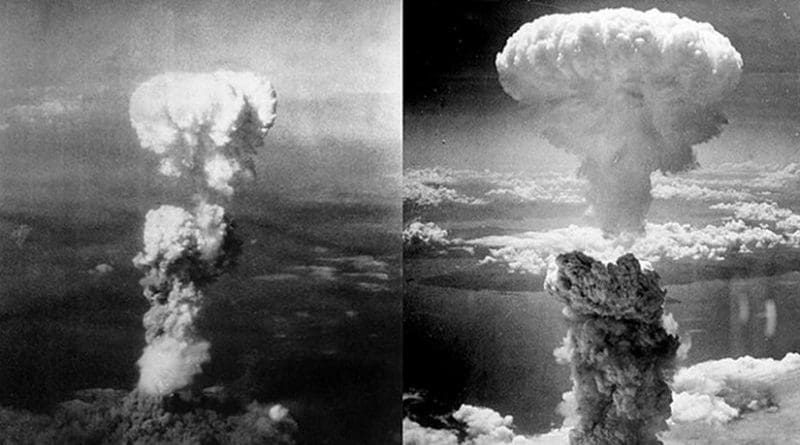Terrorism By Any Reasonable Definition – OpEd
Sixty-seven years ago, on August 6, 1945, the Truman administration dropped an atomic bomb on Hiroshima, instantly killing tens of thousands of men, women, and children, and causing a nuclear catastrophe that took thousands of more lives in the weeks and years that followed. Three days later, on August 9, the U.S. followed up by dropping a plutonium bomb on Nagasaki.
Assuming the conventional narrative we hear about these events is true, these acts were acts of terrorism by any reasonable standard. The typical story is that the Truman administration made a necessary and difficult calculus, deciding that the lives of about two-hundred-thousand Japanese civilians were worth expending so as to save the lives of even more American servicemen who would have had to invade Japanese mainland and secure victory.
But killing innocent people—including children—for the purpose of war aims and to save the lives of soldiers, whose job it is to fight, is terrorism, and contradicts centuries of international law and the Just War Theory of the Christian tradition. Those defending these murderous acts on the basis of necessity are defending the indefensible.
Yet as it so happens historical facts make the case for dropping the bombs in 1945 even weaker. For one thing, the supposed half-million or so American lives saved are a post-war fabrication. The government’s estimates before the bombings indicated that fewer than 50,000 Americans might die in an invasion. Second, the virtually unprecedented demand for unconditional surrender prolonged the war. Earlier in the year, the Japanese demonstrated a willingness to surrender but they did not want to give up their emperor. In the end, the U.S. let them keep their emperor anyway. Third, many of America’s top brass condemned the atomic bombings, including Admiral William Leahy, General Dwight Eisenhower, General Douglas MacArthur, and many others. Fourth, in 1946 the U.S. Strategic Bombing Survey determined the atomic bombings were basically extraneous to winning the war. The Japanese were already defeated, blockaded, starving, and neutralized.
Even after the bombing of Nagasaki and the emperor said he would surrender, the U.S. firebombed Tokyo on August 14 with a thousand-plane bombing mission. Was this last mass killing necessary? We rarely hear about it at all, perhaps because it throws into question the entire morality of U.S. strategic bombing in the Pacific War.
Indeed, World War II featured a mass wallowing in collectivist slaughter on the part of both the Axis and Allied Powers. Japan’s and Germany’s brutalities, some of the most notorious in the history of humanity, are appropriately condemned, yet these evils have somehow come to obscure the evils committed by the United States, Britain, and even Stalin in the course of the war. The other side was guilty of unsurpassed inhumanities, but this should not give a free pass to the Allies for their own acts of barbarism, which by any sensible standard rank among the greatest war crimes of the modern era.
America’s introduction of nuclear warfare to the world was a distinctive act of a particularly insane anti-human collectivism that all decent people should abhor. Yet in terms of the willingness to kill scores of thousands of innocents, it was consistent with the unbridled total war of the 1940s. The United States torched dozens of Japanese cities and Britain, with America’s help, devastated over a hundred German cities. Civilians were not mere collateral damage, but the deliberately chosen targets of these attacks. In Hiroshima, the population was centered largely in the middle, where the bomb was dropped, the industrial infrastructure useful to the Japanese war effort left largely unscathed on the periphery. It became the policy in this great democratic war to kill as many civilians as was possible so as to break the back of the enemy. This policy of targeting civilians, coupled with the horrendous demands for unconditional surrender, frightened the populations of Germany and Japan into clinging onto their totalitarian regimes as the only hope against being liquidated and enslaved by the Allied Powers. At the end of the war, the West participated in the forced repatriation of as many as two million subjects back to Soviet Russia and the forced migration of millions of ethnic Germans that took about a million lives.
The vast immorality and collectivism of the 20th century, most notably seen in the fascist and communist regimes that sought total control of society and the total subordination of individual liberty, were also all full display in the enterprise of total war, which the U.S. came to adopt as policy in World War II, the Korean War, and Vietnam. It should be no surprise that the main U.S. culprits being these war policies were the very liberal Democrats who favored expansionist state power at home—FDR, Truman, and LBJ—although, of course, conservative Republicans soon enough proved just as willing to participate in and advocate such war collectivism.
In particular, the U.S. in the 20th century came to dominate the strategy of killing people from the sky, as almost every major bombing mission was done under U.S. auspices in the post-War period. In these bombings from World War II through the war in Indochina, the U.S. killed millions of civilians with firebombings, chemical warfare, the targeted destruction of dams and other civilian infrastructure. Remnants of this policy were apparent in the U.S. policy toward Iraq from 1990 through the second Gulf War, when water treatment facilities were destroyed and civilians were deprived of clean water, food, and medicine with the express purpose of fomenting revolution.
The only way to regard the bombings of Hiroshima and Nagasaki, and so many other U.S. war campaigns, as anything other than state terrorism, is to define the concept in such an absurdly narrow way as to categorically exempt the U.S. from the definition out of pure convenience. If nuclear holocaust inflicted upon innocent civilians for the purpose of securing a diplomatic result is not terrorism, then there is no such thing.

